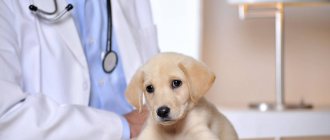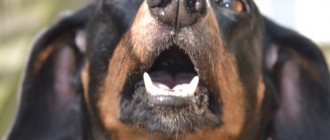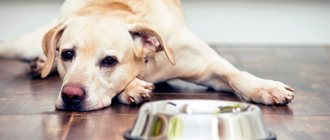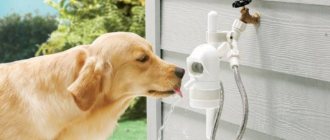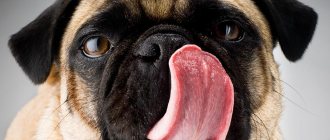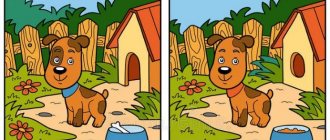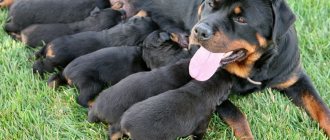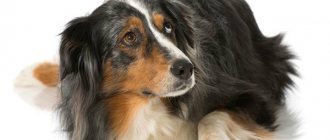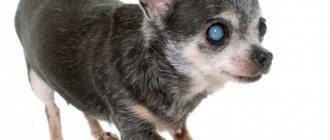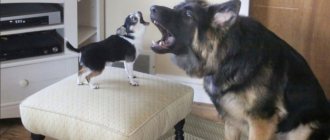What do puppy owners need to know?
Hiccups in dogs appear in the same way as in humans. Scientifically speaking, a convulsive contraction of the diaphragmatic muscles occurs. The diaphragm itself is a muscular septum that separates the sternum from the abdominal organs.
In most cases, in young dogs, the contraction of the diaphragm occurs very sharply. In this case, attacks of suffocation are possible, which do not last long. During hiccups, a characteristic sound occurs, the cause of which is the involuntary and very rapid closure of the glottis. Thanks to numerous studies, it has become known that puppies first begin to hiccup in the womb.
As a rule, hiccups in pets begin for no noticeable reason. This phenomenon is completely harmless.
Hiccups are divided into two types depending on their duration:
- Short-term. It is observed mainly in puppies as a result of overfeeding or eating food too quickly. Dogs may also hiccup for a short time if their diet does not contain enough liquid food.
- Long lasting. Some puppies may hiccup for an hour or longer. As a rule, the cause of this phenomenon is the entry of a foreign object into the stomach, helminthic infestation, or various diseases of the digestive system.
Diseases
There may be more serious reasons for long hiccups. For example, entry of a foreign body. Causes of prolonged hiccups:
- diseases of the gastrointestinal tract (for example, gastritis, etc.);
- dirofilariasis.
It happens that prolonged hiccups occur due to damage to the central nervous system. For example, this is how a complication after a nervous-type plague may manifest itself. Monitor your dog for other associated symptoms. Although it is better to show the animal to a veterinarian
Prolonged hiccups can occur in a puppy before a heart attack. Therefore, look at your pet’s behavior; he may need emergency help, or better yet, go to the clinic.
If hiccups occur periodically, it is better to consult a doctor. Typically, to stop an attack, metoclopramide (medicine "Cerucal"), a dopamine receptor blocker, is used. The drug will help calm hiccups if they are associated with gastrointestinal problems. But you should use medications only as prescribed by a veterinarian.
Why does a dog hiccup?
There are many causative factors that lead to puppies starting to hiccup:
- Sudden filling of the stomach . A similar phenomenon occurs if the dog eats greedily. Also, hiccups often occur due to the fact that the owner gives the pet only dry food or does not provide enough water. By the way, experts recommend using dry food that has been previously soaked in water for feeding puppies.
- Hiccups in puppies often appear after active games with other pets or owners. As a result of such activity, the animal's nasopharynx dries out, which causes hiccups. In this case, it is enough to give your pet some water.
- Many owners are looking for an answer to the question of why puppies hiccup, not realizing that the cause is hypothermia . This is especially true for representatives of short-haired breeds. Such dogs need to be dressed, even if they are constantly in the apartment. In particular, this applies to cases where there is a draft in the room.
- If hiccups last too long, that is, more than an hour, you should urgently consult a veterinarian, because the cause of such a long-term phenomenon may be acute gastritis, dirofilariasis, worms, or the presence of some foreign object in the stomach.
- In some cases, hiccups in dogs are caused by dysfunction of the central nervous system . For example, these could be complications after a previous plague. In this case, other symptoms are observed.
- Very often, hiccups are observed in puppies. This is explained by the fact that babies are very sensitive to any external factors.
- Often, prolonged hiccups are a harbinger of a heart attack. Therefore, you should not delay contacting the veterinary clinic.
Causes of dog hiccups
It is a convulsive inhalation, a reflex inhalation associated with a sharp contraction of the diaphragm. In a pet, hiccups can be short-term or long-lasting.
If the reason is that the dog’s stomach suddenly became full due to fast and greedy eating of food, then it will pass quickly.
Owners of dogs that are fed dry food need to know that if there is not enough water to soak such food, the pet may also experience a reflexive convulsive breath.
Veterinarians advise inexperienced dog breeders to initially soak food in water when it comes to feeding puppies. This will make it easier to avoid unpleasant phenomena.
Puppies often hiccup after rough and long games with children and the owner. After physical activity, the child’s nasopharynx simply dries up and there is an urgent need to drink water.
Young dogs can often experience hiccups due to hypothermia. And this is especially true for representatives of short-haired breeds. Veterinarians recommend avoiding prolonged hypothermia and drafts. This is the cause of short-term hiccups. If your puppy is forced to stay in a cold house all day, then he needs to be dressed.
When a dog hiccups for a long time, the reasons can be serious. This is the entry of foreign objects into the stomach, ailments of the gastrointestinal tract (acute gastritis, for example), helminthic infestations, dirofilariasis. In rare cases, hiccups can be a consequence of damage to the central nervous system, for example, complications after suffering from distemper. Usually in such cases it is not the only sign of trouble. Notice other deviations in your student's behavior.
Young dogs are more sensitive to external factors and are more likely to experience bouts of hiccups. They overeat more often than adult dogs.
By the way, practice shows that heart attacks in animals sometimes begin with prolonged hiccups. It may indicate the onset of damage to the nervous system.
How to eliminate hiccups in a dog?
- If an animal hiccups immediately after eating, it needs to be given some warm, clean water. You can also offer your pet a piece of sugar.
- If the phenomenon occurs due to too rapid swallowing of food and air, it is enough to gently massage the dog’s stomach.
- In cases where hiccups occur very often, you need to make sure there are no worms. It is best to resort to the prophylactic use of appropriate medications. If hiccups still persist after taking them, you should contact your veterinarian to determine the exact cause.
- When an animal does not stop hiccupping for a long time, you can gently grab the dog by the front paws so that it stands on its hind legs and stands there for 2-3 minutes. After this, pets almost always stop searching.
- In some cases, taking special medications . So, dogs are given metoclopramide, that is, a dopamine receptor blocker. It helps eliminate hiccups caused by dysfunction of the digestive system. Sometimes the administration of tranquilizers and neuroleptics, namely seduxen, etaparazine or aminazine, is indicated. Such drugs are used only as directed by a doctor.
- Puppies need to be fed according to their daily allowance. This is especially true for dry food, which is rich in nutrients, which puts a lot of strain on the digestive system. It must be remembered that food for dogs under 6 months of age is pre-soaked in water.
What to do when your dog hiccups?
If a dog experiences short-term hiccups after eating, the owner is advised to simply give him warm water. You can treat the animal with a piece of sugar.
When a convulsive breath with a sharp contraction of the diaphragm is observed in a puppy after quickly swallowing food, you can simply massage his stomach with light hand movements and warm him up. Some dog breeders, when their dogs have short-term hiccups, simply take the animal by the front paws and hold it on its hind legs. That is, the dog is given a vertical position - and the problem quickly disappears. Exercise, when performed regularly, helps eliminate hiccups in a young dog forever.
If your pupil hiccups very often and at the same time eats slowly and does not overeat, then veterinarians advise in such cases to deworm him. This must be done once every three months, and if the procedure has not been carried out longer, then it is likely that worms may be the cause of the hiccups. When, even after this measure, everything remains the same for the dog, then you need to look for other reasons.
Sometimes it happens that the owner cannot independently determine what causes the dog to hiccup. Then it is better to consult a veterinarian. Usually attacks can be stopped with the drug cerucal. It is a dopamine receptor blocker that calms hiccups associated with digestive system problems. Other medications, especially antipsychotics, should be taken by pets only as prescribed by a doctor!
From the very beginning of the puppy’s appearance in your home, try to feed it strictly according to age standards. Do not give supplements and do not respond to begging requests for food from the table. And there is no need to mix natural food with dry food to make it more filling. Sometimes inexperienced dog owners do this, causing overeating and bouts of hiccups.
Hiccups in dogs occur as a result of breathing problems and last from several minutes to an hour or more. Most often, puppies and young animals under the age of 12-14 months hiccup. Short-term hiccups do not pose a danger to the animal, but sometimes attacks of hiccups may indicate the presence of certain diseases, so if this phenomenon occurs, it is worth finding out why the dog is hiccupping.
Attacks of hiccups in dogs occur at different times and last several minutes, and sometimes several hours. Short-term attacks occur when eating food quickly and greedily. Along with food, the dog swallows air, which penetrates the lungs and stomach and causes spasm of the diaphragm.
Hiccups in a dog can last from a few minutes to several hours.
The cause of hiccups in dogs can be a stressful situation or any excitement.
For daily hiccups. If this does not help, a mandatory consultation with a veterinarian is necessary.
Puppies hiccup especially often. This is due to the preservation of a rudimentary reflex in the first months of life after leaving the mother’s womb. This reflex allows you to strengthen the muscles of the esophagus and lungs. After eating, the puppy hiccups due to his own greed. By swallowing food too quickly, he, like an adult dog, swallows air.
Hiccups can develop in a dog due to a lack of fluid in the body:
when eating dry food or after frisky games, when the nasopharynx dries out. After eating, hiccups may appear if the food is hot.
A dog hiccups when it's cold. This phenomenon is often observed in winter while walking. Hiccups from hypothermia can appear in hairless and short-haired dogs (). To prevent the dog from freezing, it needs to be dressed in warming suits for walks and in cold rooms. In particularly cold and windy weather, walks are reduced to a minimum.
The dog hiccups for a reason! We determine the cause and begin treatment
Uncontrolled irritation of the nerve endings in the diaphragm, which causes its spasm and, as a result, hiccups - a sudden and uncontrollable phenomenon. Most often, the attack ends without the intervention of the owner, as suddenly as it began. However, if your dog hiccups, he will become uncomfortable, irritated, and distracted. You need to understand that there are a number of reasons that cause an attack and preventive measures to prevent inconvenience.
Is it dangerous
Hiccups themselves, as a physiological reaction, do not pose a danger to the life of the animal . The degree of danger of an attack for a dog is determined by how serious its causes are.
If the disorder is episodic in nature, the attacks last a short time and go away on their own, then there is no reason to worry. This is a natural reaction of the body to one or another external irritation.
If hiccups continue for a long time, attacks are repeated daily, accompanied by other alarming symptoms, then you need to look for internal pathology, which is the cause of sudden spasms of the diaphragm. It is necessary to take the animal to a veterinary clinic as soon as possible for professional diagnostics.
After identifying the primary disease, treatment will be prescribed that will help eliminate not only the symptom, but also its cause.
What is hiccups?
Every person has felt the discomfort of hiccups on themselves, a tiring inconvenience, hasn’t it? So why do seizures occur? Hiccups in a dog are a sharp breath in response to an “incorrect” nerve impulse. An intense inhalation is accompanied by a spasm of the intercostal muscles, as a result of which something like a “reverse thrust” occurs. The body receives a signal to shut off the air. Each spasm is accompanied by a characteristic sound - this is a reflex closure of the epiglottis. Next, a “chain reaction” occurs, the vibration of the chest again irritates the nerve endings, the diaphragm contracts and another attack occurs.
Note! Puppies are more susceptible to hiccups than adult dogs and there are a number of reasons for this: weak ligaments holding internal organs, disproportionate distension of the stomach, increased nervous excitability, etc.
Causes
When a dog hiccups, the reasons for this lie in irritation of the phrenic and vagus nerves that innervate the diaphragm. This leads to its reflex contraction. At the same time, the intercostal muscles are tensed. The dog takes an involuntary breath, which is interrupted by a spasm of the epiglottis muscles. Thus, during the act of hiccups, the animal experiences a kind of short suffocation.
Irritation of the phrenic and vagus nerves can be caused by various reasons - both physiological and pathological. Based on this criterion, the types of hiccups are classified.
In most cases, hiccups in dogs are a natural reaction of the body . Otherwise, it is called short-term, since it usually appears sporadically and does not last long (from several minutes to half an hour).
Attacks of short-term hiccups are most often experienced by puppies and young dogs whose age does not exceed 8 months. Their body is not yet fully formed, and this is a very strong provoking factor.
The main causes of short-term hiccups in young animals are:
- unstable, overly excitable nervous system;
- weak ligaments (ligaments) that hold the internal organs in place;
- undeveloped muscles of internal organs.
Thanks to these features, in some situations the young body reacts with an attack of hiccups.
Most often this happens in the following cases:
- greedy absorption of poorly chewed food;
- swallowing air while eating;
- insufficient amount of liquid in the diet;
- dry throat after sleep or during active play;
- severe hypothermia (dogs with short hair often suffer);
- stress or severe fear;
- uncomfortable sleeping position causing stimulation of the phrenic nerve.
Attacks of short-term hiccups are harmless and end on their own after a short time.
Hiccups as a sign of illness
It is much less common for frequent hiccups in a young dog to be a symptom of a serious illness. It is called long-term (or indomitable) and is caused by another group of provoking factors.
Attacks of prolonged hiccups appear regularly and can last for quite a long time (for several hours or even days).
They are usually caused by a malfunction of various body systems:
- Digestive. The cause may be helminthiasis, poisoning of the body, enzymatic deficiency, flatulence, or intestinal obstruction.
- Respiratory, when inflammatory diseases of the upper or lower respiratory tract develop. Hiccups may be accompanied by coughing, sneezing, and difficulty breathing. The most dangerous are asthma attacks or respiratory allergies.
- Nervous. Hiccups can occur as a complication of nervous distemper, or be a consequence of recently suffered meningitis, encephalitis, or complicated enteritis. It is accompanied by neurological symptoms - lack of coordination of movements, disorientation in space, circling, paw tremor.
- Cardiovascular. A prolonged attack may be a symptom of a developing heart attack or stroke. Older dogs are most susceptible to these diseases.
Attacks of pathological hiccups occur after a recent injury.
If a pet has swallowed a foreign object - a small toy, a pine cone, a pebble, then hiccups are accompanied by strong salivation. In such situations, urgent consultation with a veterinarian is always necessary.
Are hiccups dangerous for dogs?
It is generally accepted that attacks of hiccups are a natural reaction of the body to irritation of nerve endings. The reasons that cause short-term and harmless hiccups are as follows:
- The dog hiccups after eating. Possible causes are overeating, swallowing air, dry or coarsely cut food. Provide peace to your pet while eating, especially for owners who have several charges. Competition is an incentive to swallow without chewing. Food should be served warm, moist and chopped. It is recommended to place bowls on a stand at the height of the dog.
- After resting or waking up in the morning - refers to choleric people who jump up and run as soon as they open their eyes. Most often associated with drying out of the nasopharynx.
- A puppy who has fallen asleep in an unnatural position may hiccup while sleeping or upon waking up; this is due to physical irritation of the vagus nerve.
- After active games, the reason is also associated with drying out of the mucous membranes.
- Fright.
- Hypothermia is more common in short-haired and hairless dogs.
If the animal hiccups every day, the attacks are not associated with “natural” causes or last too long, you should see a veterinarian. To compile an anamnesis, you need to pay attention to the work:
- Digestive system - possible worm damage, diarrhea, flatulence, indigestion, blockage.
- Respiratory system – presence of cough, shortness of breath, snoring, irritation of the mucous membranes.
- Central nervous system - loss of coordination, unfocused gaze, tremors, recent diseases (distemper, meningitis, enteritis).
Possible causes also include foreign bodies entering the stomach. If the dog could have eaten part of the toy, rope, or soil, an x-ray will be needed. Any intoxication lasting more than 2 hours has a detrimental effect on the functioning of the central nervous system; in parallel with hiccups, tremors, weakness, salivation, vomiting, and “cyanosis” of the mucous membranes are observed.
Causes of unhealthy hiccups
If a dog hiccups not only after eating, active physical activity or hypothermia, then it makes sense to contact a veterinarian to determine the causes of the pathology. Perhaps the problem is the following:
- Disruption of the digestive system. This may include various stomach disorders (diarrhea, constipation, flatulence), indigestion, worms, etc.
- Damage to the nervous system. When an animal is sick with enteritis, meningitis or distemper, along with hiccups, there may be partial loss of coordination, muscle tremors, lack of focus and other symptoms.
- Destabilization of the respiratory system. In this case, the dog will experience shortness of breath, coughing, snoring, as well as excessive irritation of the mucous membranes.
- Penetration of foreign bodies into the stomach. These can be small toys, threads and ropes, parts of dishes and other household items. Severe intoxication can be expressed in the following symptoms: vomiting, increased salivation, muscle weakness, cyanosis of mucous membranes, tremor.
How to help a hiccupping dog
You can rid your dog of hiccups yourself, provided you know the cause of its occurrence:
- For babies who most often greedily absorb food, a abdominal massage is indicated after eating. While the puppy lives with its mother, it receives all the necessary procedures, however, after weaning and moving to a new home, gastric peristalsis still needs stimulation.
- To relieve hiccups in a dog after eating, you need to offer your pet a warm drink and feed a small sugar cube. If the attacks have not stopped, lift the dog by the front legs and walk in pairs. Your manipulations will distract the pet and allow the accumulated air to rise to the throat, the “dancing” will culminate in a belch and the end of the hiccups.
- Try distracting your pet with games or a short run.
What to do if loyal methods did not help? Once again, assess the risks and stop the attack of hiccups by injecting one of the following medications:
- Cerucal is metoclopramide, a receptor blocker responsible for spasms. causing hiccups and vomiting.
- Tazepam, Seduxen are tranquilizers that relieve the sensitivity of nerve endings.
- Aminazine is an artificially synthesized antipsychotic that causes an “inhibiting” effect on the central nervous system.
Note! Drowsiness after injections of drugs that reduce the activity of the nervous system is normal.
How to get rid of hiccups
You can help your animal at home in the following ways:
- Massage your stomach after eating. Especially indicated for puppies recently weaned from their mother. Since the digestive organs are not yet fully formed, intestinal motility is disrupted when food is quickly swallowed. The massage is performed by light stroking movements in the abdominal area.
- Drink plenty of fluids. To relieve an attack of hiccups, you need to give the dog warm water and also feed it a piece of sugar. Sweetness will help relax the nerve receptors and return to normal breathing.
- Distract attention with games. Switching the animal to another wave will help relieve tension from the nerve endings and help stop an attack of hiccups.
- Walk on your hind legs. In other words, make the dog “dance” by taking it by the front paws and thus placing it in a vertical position. The air accumulated inside will rise to the throat and come out in the form of a belch.
Why does a puppy hiccup and what to do about it?
Beginning dog breeders are often frightened by the phenomenon of hiccups in dogs. Although such a breathing disorder in an animal can occur for a variety of reasons and manifest itself in both puppies and adult dogs. Moreover, veterinarians advise owners not to worry too much about their pet if the hiccups last a short amount of time. And vice versa, urgently take him for examination if the dog hiccups continuously for 2-3 hours in a row, since in this case the phenomenon can act as a symptom of a serious pathology. The article will discuss the causes of hiccups, as well as methods of its treatment and prevention.
What should you do if you hiccup?
Often, hiccups in four-legged pets go away on their own, without any intervention from the owner. However, some attacks can cause discomfort in the animal or threaten its health.
Eating related problem
The involuntary contraction of the diaphragm that occurs after eating can be easily eliminated by giving the animal a small piece of refined sugar or warm water. It is very common for puppies to eat their food excessively quickly and/or start playing immediately after feeding, which causes air to enter the intestines. The resulting hiccups can be easily eliminated with a gentle abdominal massage. You can also use the method recommended for eliminating hiccups in young children - the “column”. To do this, the animal carefully grabs its front paws and rises. This will force him to stand on his hind legs. It is optimal for the pet to remain in this position for at least three minutes.
To prevent involuntary contraction of the diaphragm after feeding, active games should be avoided for several hours after the last meal. It is also not recommended to give food immediately after a walk.
As for the treatment of hiccups in puppies after eating, tactics involve not only strict adherence to the feeding schedule. Strict adherence to the daily norm is also of great importance. This requirement is especially relevant for dry food. Due to the high content of nutrients, they place a strong burden on the digestive tract. Therefore, dry food given to a young dog must be moistened. Lack of access to water after such feeding is the main cause of hiccups. Also, treatment tactics should involve making adjustments to the diet - feeding the puppy is based on industrial food, cereals, and vegetables.
Worm infestation
Gastrointestinal pathologies
If, after examining the dog, the veterinarian determines that the animal is suffering from some kind of gastrointestinal disease, he will recommend treatment. It consists of taking a dopamine receptor blocker. In severe cases, the doctor may recommend the administration of antipsychotics and tranquilizers. The dosage should be calculated exclusively by a specialist.
In case of confirmed gastrointestinal disease, the recommended injections can be given by the owner himself. No special experience in these matters is required. It is enough to observe how the doctor administers the medicine several times.
Congenital anomalies
In some cases, the answer to the question of what to do if a puppy hiccups for no apparent reason may be surgery. This option may be recommended if the animal has a physical abnormality of the diaphragm. A minor surgical intervention will help relieve your dog of discomfort.
Reasons for appearance
Hiccups can be both short-term and long-term, and the duration of the phenomenon itself depends entirely on the reasons that led to it. If the owner has wondered why the dog hiccups, then the following information will help him answer it:
- The animal often hiccups due to oversaturation. Rapid filling of the stomach is one of the most common factors in this phenomenon. After a long and intense walk, active physical exercise, the dog absorbs food greedily and immoderately, which leads to hiccups. When feeding your dog dry food, make sure that there is always a sufficient amount of water near it.
- Owners interested in why a puppy hiccups should consider the two most possible options: he does this either because his body is hypothermic, or after stormy and fun games with the owner or his fellow breeders.
- In general, experts are convinced that hiccups most often occur in young animals. If the puppy does this quite regularly, then do not be alarmed, this is how the growing body tries to strengthen the muscles of the lungs and stomach.
- Research by animal psychologists has shown that four-legged pets hiccup due to severe fright or stress. Stress-generating situations include a thunderstorm, a long absence of the owner, going to places with large crowds of people, and sometimes the appearance of a new pet in the house. In this case, you need to sit down with your pet, talk to him tenderly and caress him. He will quickly calm down and the hiccups will go away.
Long-term hiccups deserve special consideration, as they can be caused by very serious problems that are best not ignored. Doctors have identified the following reasons for such a reflex, which is significantly extended over time:
- Pathologies of the gastrointestinal tract, while the hiccups themselves can end in severe belching or vomiting.
- A foreign object entered the dog's stomach.
- If the dog has worms. If parasites have been living in the pet’s body for a long time, then an attentive owner will be able to notice the worms when he burps.
- As a consequence of damage to the central nervous system or the onset of a heart attack.
- After severe mechanical trauma, the phenomenon itself is aggravated by other unpleasant symptoms.
- Your puppy may get a pinched vagus nerve while sleeping. Eliminating such hiccups is quite easy; you just need to move the puppy yourself to a more comfortable position for dreaming.
- If your pet has a choleric temperament, then this phenomenon is provoked by the fact that after waking up he jumps up too actively, thereby disrupting the breathing rhythm.
Hiccups as a natural reaction
In most cases, the described attacks are short-term and do not pose a danger to the pet. A healthy dog hiccups for the following reasons:
- After waking up in the morning or resting during the day. This applies to a greater extent to impulsive puppies of the choleric type. It is common for them, as soon as they open their eyes, to quickly pick up and rush towards their owners. A dry nasopharynx after sleep causes “wrong” nerve impulses.
- Due to taking an uncomfortable position while sleeping. This is due to physical stimulation of the vagus nerve. In such cases, hiccups occur either during sleep or after waking up.
- As a result of an unsuccessful meal. Consuming large chunks, swallowing dry food that has not been moistened with water, overeating, rushing at the sight of a competitor, getting air into the esophagus (for example, due to the need to get food from a high stand) are the most common eating disorders that explain why a dog hiccups after eating. .
- Due to drying out of the nasopharyngeal mucosa after excessively active activity: frisky play, long running, jumping.
- Thanks to hypothermia, to which “nabbies” and representatives of short-haired breeds are more susceptible. These pets have to be dressed even in apartment conditions, especially in the presence of drafts.
- Due to stress or severe fear. Thunder, the appearance of another animal in the house, a long absence of the owner, or being in a crowd can cause extreme anxiety.
Is it possible to ignore hiccups?
Experts are convinced that short-term forms of this phenomenon, often occurring after eating, will not harm the pet in any way. Another thing is long-term hiccups, which last for hours and even days, and which, at first glance, do not have any good reason. It is important to understand that if a dog hiccups for a long time and continuously, then this is abnormal and can lead to such unpleasant consequences as:
- dysfunction in the pet’s respiratory system, which is aggravated by snoring, coughing, frequent and shallow breathing;
- pathologies of the central nervous system, manifested in trembling of the limbs, complete or partial loss of coordination, and impaired attention in the dog. Those individuals that have recently suffered from serious illnesses such as enteritis or meningitis are especially vulnerable to this;
- problems with the gastrointestinal tract, including constant flatulence and indigestion.
Owners must take note that if hiccups last more than 2-3 hours, then this is a direct sign of an impending stroke or heart attack in the dog. The next section will discuss in detail information about what to do if your dog hiccups.
Hiccups as a painful manifestation
Attacks that are observed daily, last a long time and are not associated with the above reasons are a reason to be wary. The owner must definitely arrange a meeting between the pet and the veterinarian and find out why the dog often hiccups.
Pathology can be a consequence of malfunctions in several body systems:
- digestive, suffering from the destructive activity of worms, food or chemical poisoning, indigestion, increased gas formation, blockage;
- respiratory, signaling inflammation or other problems by shortness of breath, snoring, coughing, sneezing;
- nervous, declaring its disorder by disorientation in space, uncoordinated movements, tremors, unfocused gaze (often such symptoms are reminiscent of a recent illness that affects the functions of the central nervous system - enteritis, meningitis, etc.).
When taking a history of a dog that hiccups and licks itself, foreign bodies may be found in the stomach. They turn out to be fragments of toys, laces, food bags, stones. All these foreign objects are clearly visible on an x-ray.
An attack of hiccups that does not stop for more than 60 minutes can be a harbinger of dangerous pathologies - stroke, heart attack, severe intoxication.
Elimination methods
For short-term dog hiccups, it is permissible to use the following recommendations from veterinarians:
- If the factor that caused the hiccups was food, then the owner, to eliminate it, can try to do the following: give the pet warm water or give him a piece of refined sugar, and then pat his tummy.
- Take your pet by the two front paws and “dance” with him a little. This will not only distract your shaggy friend, but will also allow air to escape in the form of a burp.
- Puppies benefit greatly from a light and gentle abdominal massage. It relaxes the dog's muscles, which means the chance that the hiccups will go away will increase significantly.
- Dogs who have become hypothermic outdoors or at home in a draft will benefit from intensive warming. It will not only eliminate hiccups, but also protect your pet from colds.
- Intense physical activity is no less effective during such breathing problems. Engage your pet with active play or a short run.
- Classic methods include scaring the pet. However, animal psychologists advise doing it extremely moderately, so as not to provoke the dog into aggression or even more hiccups.
Remedies
The method for eliminating hiccups depends on its cause. When deciding what to do, the owner must understand whether he can do it on his own or whether he needs to consult a veterinarian. If seizures associated with food intake are noticed, you need to apply several recommendations for feeding animals:
- check whether you are calculating portions correctly, especially when feeding ready-made food;
- make sure there is enough feeding (for puppies from 6 times a day, the frequency of meals gradually decreases, but not sharply);
- give food at room temperature;
- select products recommended for representatives of a particular breed, subject them to the correct heat treatments;
- Always provide access to clean water, especially after meals.
If seizures occur during sleep, after waking up, check whether your pet has enough space. He should lie down freely, taking a position that is comfortable for himself. Stiffness causes it to bend and twist, which can put pressure on the diaphragm.
Hiccup medications
If the attacks are not short-term, but occur for a long time (several days periodically or several hours in a row), you need to seek veterinary help. To eliminate hiccups, the root cause must be treated. For example, if gastritis or another gastrointestinal disease that provokes contraction of the diaphragm is detected, drug therapy and diet are prescribed.
There are also drugs that directly eliminate hiccups. Popular ones are:
- Cerucal - blocks the receptors responsible for spasms during contraction of the diaphragm;
- Tazepam – blocks nerve endings, is a tranquilizer;
- Seduxen is an analogue of Tazepam;
- Aminazine – normalizes the functioning of the nervous system.
The drugs are potent, so they are used only as prescribed by a doctor.
Considering the large number of possible causes that provoke hiccups in dogs, there is no one recipe for its treatment. If it is provoked by factors associated with poor diet and sleep, the owner can eliminate them. Sometimes contraction of the diaphragm is a symptom of serious diseases of the internal organs, then consultation with a veterinarian and the use of the therapy prescribed by him are required.
Prevention measures
If hiccups persist for a long time, take your dog to a specialist for examination.
Such measures are justified, since if something happens, the owner will be prepared for aggravation of symptoms and will be able to provide prompt assistance to the pet. After a complete diagnosis of the dog, the veterinarian may prescribe medications such as Cerucal (blocks receptors that cause uncontrollable muscle spasms) or Seduxen (eliminates excessive sensitivity of the animal’s nerve endings).
In addition, the owner is obliged to monitor the feeding standards of his pet. Under no circumstances should you give him too hot food; this not only spoils his sense of smell, but can also cause hiccups. Form the portion based on the size and weight of the animal. Overfeeding has an extremely negative impact on the health of dogs. If a dog eats dry food, there should always be a sufficient amount of clean water nearby so that he can quench his thirst. Puppies up to 5-6 months old are given industrial food only after they have been soaked in liquid.
You should not ignore hiccups, as this phenomenon is not as common as it might seem at first glance. The owner should try to eliminate it himself, and if this does not work, then take the animal to be examined by a doctor.
Puppies, like little children, can have funny hiccups. What causes this and is it dangerous for the animal? How can I help him and stop the hiccups? Answers to the most frequently asked questions can be found in this article.
It would not be superfluous to write about your experience of helping a four-legged pet, because it can help others cope with the problem that has arisen, of course, if we are not talking about something serious. In any case, it would not be superfluous to contact a veterinary clinic or call a veterinarian at home to make an accurate diagnosis.
Why does a puppy hiccup after eating, during and after sleep, play, at night, in the morning: reasons and what to do
A puppy may hiccup after eating if he greedily ate food and swallowed air. It happens that hiccups occur after eating dry food. Therefore, it is better for puppies to moisten it with water.
During or after sleep, the puppy may hiccup because it is cold. Warm him up and give him warm water to drink. If the baby refuses to drink, you can take him by the front paws and hold him in a standing position for a while, the hiccups will soon go away.
During play, the puppy may hiccup because he recently ate or because his nasopharynx is dry. Give him warm water. Some diseases of the gastrointestinal tract can also cause hiccups.
The puppy hiccups and burps, diarrhea, breathes heavily, lethargic
Prolonged and frequent hiccups with signs of stool disorder and lack of appetite are a reason to visit a veterinarian.
The cause of this condition may be diseases of the gastrointestinal tract, as well as helminthic infestations.
If a puppy hiccups, what does it mean, is it normal or not?
Not only puppies hiccup, but also adult dogs. This process is caused by involuntary contractions of the diaphragm, which are often repeated.
You can determine how dangerous hiccups are by its duration, frequency of occurrence, and the general well-being of your pet.
If the puppy feels great and has bouts of hiccups rarely, after a heavy meal or when he is cold, there is nothing to worry about.
When you can't call or get an appointment with a veterinarian, a shot of metoclopramide (a specific dopamine receptor blocker) can help stop lingering hiccups if all else fails.
Prolonged hiccups can cause a heart attack. Hiccups may also indicate problems with the nervous system. Therefore, it is necessary to visit a doctor for examination as soon as possible.
The article contains the most interesting information about this breed, as well as basic information about those dogs that use the most…
The article gives you the opportunity to get acquainted with what breeds of dogs and puppies today can be the best friends for children or which of them…
Hiccups are completely normal in puppies. Dogs may hiccup due to overeating or severe fright. In some cases, it is almost impossible to find a clear cause. Moreover, dog breeders sometimes don’t notice their pet’s hiccups at all. In essence, this phenomenon is a convulsive reflex inhalation, during which the diaphragm sharply contracts.
Long-term hiccups are a sign of disease
Short-term hiccups are a phenomenon that passes quickly and does not require solving the problem with the help of medical means. If the dog hiccups for a long time, or it happens too often, the owner should contact the veterinarian and find out the reason.
Hiccups often occur in active dogs that suddenly jump up and immediately run.
Long-term hiccups can occur for the following reasons:
- A foreign object entered the dog's stomach.
- The dog developed diseases of the gastrointestinal tract (). In this case, hiccups may be accompanied by belching and even vomiting.
- The dog is infected with worms (). Sometimes in this case you can notice worms in the burp.
- If hiccups occur after an injury, other additional symptoms may occur.
- Hiccups can be a consequence of damage to the central nervous system or the onset of a heart attack. In this case, the pet needs urgent help from a veterinarian.
- Choleric dogs that jump up and run immediately after waking up may also begin to hiccup.
- A puppy sleeping in an unnatural position may hiccup due to a pinched vagus nerve. Once you place it correctly, the hiccups will stop.
Hiccups after eating
Hiccups after eating are a natural reaction of the body. There are three main reasons:
- Distension of the stomach.
- Swallowing air.
- Stress from competition.
Puppies are most often prone to excessive food consumption (overeating), which leads to stomach distension. If your dog regularly hiccups after eating, try feeding it in fractional amounts. Simply put, divide the daily portion of food into 5-6 parts and feed the dog every 2-3 hours.
If this method eliminates hiccups, carefully review your diet. The dog’s menu should include lightweight but nutritious foods, minimizing grains and other foods that take a long time to digest.
Note! Overeating can be a signal of helminthic infestation! Make sure that your pet receives timely prevention of parasites, since infestation can lead to vitamin deficiency and a distortion of appetite.
When consuming food and water, the dog must stand correctly. If your pet has to hunch or reach for a bowl, along with food or water, he will take in a lot of air. Air accumulates in the stomach and forms a bubble, which presses on the diaphragm and causes hiccups. A special stand for bowls will help correct the situation.
The cause of swallowing air may be hasty eating. In this case, the dog needs to buy a special bowl with a high structural bottom. If your pet is kept on dry food, you can place a small ball in the bowl, which will prevent the dog from grabbing the food with its entire mouth.
Note! Rushing, greedy eating may indicate an uncontrolled appetite, which is a symptom of many diseases, including diabetes.
Rushed eating may be due to competition if there are other animals in your home. Dogs have a habit of quickly eating their own portion and checking someone else's bowl. In this case, pets need to be fed separately. After each of them has finished their meal, the bowls must be put away out of reach.
The puppy hiccups every day - reasons for constant hiccups
If your puppy hiccups every day, it is very important to determine the causes of constant hiccups as quickly as possible.
- Everyday hiccups are usually observed in puppies up to 3-5 months of age, during a period of intensive growth and development.
- Most often, daily attacks of hiccups indicate a severe infection with helminths and the presence of pathogenic bacteria in the body.
- This condition indicates indigestion, flatulence, and overeating.
- If a puppy behaves restlessly and unnaturally during hiccups, and symptoms uncharacteristic of a healthy dog are noticeable, there is no need to guess what caused this condition. Contact your veterinarian for help.
Games and food
If hiccups appear in an animal after eating, this is due to the stomach filling too quickly when the dog greedily absorbs food. In some situations, this phenomenon also appears in puppies that consume dry foods and insufficient amounts of water. Together with dry food, the pet involuntarily swallows air with its mouth, which causes the diaphragm to contract, entering the stomach and lungs. This also happens when the dog begins to lick his lips.
In this case, it is advisable to increase the volume of liquid in the dog’s “menu”. Experts also advise pre-soaking dry types of food in clean water.
Also, hiccups can begin if the puppy has recently finished frolicking with its relatives. The reason is a dry nasopharynx. To solve the problem, the dog just needs to pour water. You can also put the puppy on its hind legs and hold it in this position for several minutes.
Another fairly common cause of contractions of the diaphragm in animals is considered to be severe stress or some kind of significant excitement.
Puppies often hiccup because they are cold. That’s why many owners dress their dachshunds, Yorkies, chihuahuas and other pets in special overalls, even at home. In this case, the animal should be protected from exposure to drafts, and in windy and frosty weather it is recommended to reduce walks to a minimum.
We also recommend reading:
